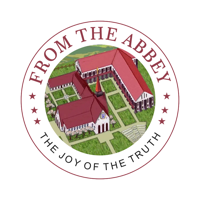
Sitting in the Crypt: Self-Reflection and Self-Knowledge
By all means use sometimes to be alone. Salute thyself: see what thy soul doth wear. Dare to look in thy chest; for ’tis thine own; And tumble up and down what thou find’st there. Who cannot rest till he good fellows find, He breaks up house, turns out of doors his mind.
Herbert.
Our theme for the first Thursday of Lent is self-reflection and self-knowledge.
G.K. Chesterton famously declared, “Angels can fly because they take themselves lightly.”
Spiritual masters constantly tell us that following Christ means to think about ourselves less and to think of others more.
Yet, self-knowledge is also an important part of building an interior life.
As usual when we run across an apparent contradiction in our faith, the truth is BOTH AND. It’s bigger than we imagined and holds the apparent contradictions in tension. While we need to avoid becoming self-absorbed, we do want to know ourselves truthfully. That’s why so many spiritual masters tell us that self-knowledge means first and foremost awareness of our sinfulness.
True knowledge works in the first place repentance and grief, changes laughter into weeping, joy into sorrow. In the second place, amendment ; no longer are
the members made instruments of unrighteousness, revelling is banished, pride mortified, and the body preserved in temperance and chastity. The Spirit guards every avenue of evil, directs its attention on every side ; hence is born, thirdly, watchfulness. We begin to walk thoughtfully before our God, to examine ourselves carefully, that we offend not wilfully, in the least degree, the Majesty of Him with Whom we have to do.
Bernard.
But along with awareness of our sin comes awareness of two very important truths.
- That we are made for more than sin offers. We are made to love God and to be loved by Him. We are made to participate in God’s divine life. We are made for glory! So when we sin, we fall short of the glory that God created us for. We miss out.
- That the Holy Trinity loves us so much that the Son became man to die for us, and the Holy Spirit enters our very souls through grace so we can participate in the love of the Holy Trinity. Our sins can be forgiven because of Jesus’ love. God wants to restore us to his love. Because of His grace moving in us, we can do and be good.
We should supplicate the grace of God to enlighten us in the knowledge of ourselves, to expose to us our own unworthiness and guilt. We should try ourselves by some of the leading principles and duties of religion—whether we have frequent and serious thoughts of God whether we view with lively gratitude and faith, the exalted plan of salvation through his Son Jesus Christ—whether we cherish firm and
lively resolutions of obeying Him—whether we faithfully perform the duties of that station in which we are placed, both in reference to the public and our own private families—whether we are active and zealous in doing all the good in our power to the bodies and souls of men—in short, whether the service of God be our supreme aim and highest enjoyment.
So when we examine our conscience, we should think about our sins, and our weaknesses. But we should also think about our good actions, the good movements of our hearts, and the holiness that God wants for us. We should think about how we fall short, but also about the progress that we made.
True humility doesn’t mean thinking that we’re nothing but scum. It doesn’t mean focusing on the negative and shrugging off the positive. It means accurately knowing who you are – all of you. It means honestly recognizing your sinfulness, weaknesses and inabilities. It also means recognizing your goodness, strengths and abilities.
To keep from being self-absorbed and prideful we should look at the goodness with thankfulness. We don’t do this (as is sometimes stated) because we are incapable of goodness in ourselves. That would be to forget that God made us for goodness and gave us grace to restore us to goodness. We adopt an attitude of gratitude because we recognize that any goodness we do participates in God’s own goodness.
We participate in God’s life because we are in a relationship of love with Him.
The frequent examination of our hearts and lives makes us thoroughly acquainted with ourselves, a knowledge of the greatest importance. It prompts us to repentance, as the only remedy for the guilt which, by our sins, we have contracted. It disposes us to humility, from a lively sense of our frequent errors and miscarriages. It keeps us in a state of constant preparation for death, by making us careful to avoid all sin, and by exciting us to the practice of those holy graces and virtues which will prepare us for Heaven.
True repentance means to move away from sin and toward goodness. As you think about who you are, consider not only where you fall short, but where you need to go to realize the holiness you are called to.
Reflection Questions
- What weaknesses of character tend to lead you into sin or hold you back from holiness?
- What strengths of character lead to good movements of your heart, and to good actions?
- What virtues could you grow in to more fully realize the goodness that God has planned for you?
Quotations taken from A Rosary for Lent by Miriam Coles Harris. This book is in the public domain.

